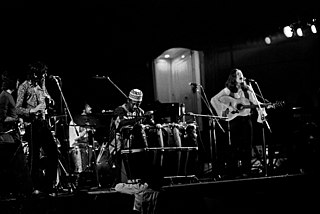
Traffic were an English rock band formed in Birmingham in April 1967 by Steve Winwood, Jim Capaldi, Chris Wood and Dave Mason. They began as a psychedelic rock group and diversified their sound through the use of instruments such as keyboards, sitar, and various reed instruments, and by incorporating jazz and improvisational techniques in their music.

Blind Faith were an English supergroup featuring Steve Winwood, Eric Clapton, Ginger Baker, and Ric Grech. They were eagerly anticipated by the music press following on the success of each of the member's former bands, including Clapton and Baker's former group Cream and Winwood's former group Traffic, but they split after a few months, producing only one album and a three-month long summer tour.

Stephen Lawrence Winwood is an English musician, singer and songwriter whose genres include blue-eyed soul, rhythm and blues, blues rock and pop rock. Though primarily a guitarist, keyboard player and vocalist prominent for his distinctive, soulful high tenor voice, Winwood plays other instruments proficiently, including drums, mandolin, bass and saxophone.

Nicola James Capaldi was an English singer-songwriter and drummer. His musical career spanned more than four decades. He co-founded the progressive rock band Traffic in 1967 with Steve Winwood with whom he co-wrote the majority of the band's material. He was inducted into the Rock and Roll Hall of Fame as a part of Traffic's original lineup.

"Gimme Some Lovin'" is a song first recorded by the Spencer Davis Group. Released as a single in 1966, it reached the Top 10 of the record charts in several countries. Later, Rolling Stone included the song on its list of the 500 Greatest Songs.

The Spencer Davis Group were a British band formed in Birmingham in 1963 by Spencer Davis (guitar), brothers Steve Winwood and Muff Winwood, and Pete York (drums). Their best known songs include the UK number ones "Somebody Help Me" and "Keep on Running", "I'm a Man" and "Gimme Some Lovin'", which reached #2 in the UK and #7 in the US.

"I Put a Spell on You" is a 1956 song written and composed by Jalacy "Screamin' Jay" Hawkins, whose own recording of it was selected as one of the Rock and Roll Hall of Fame's 500 Songs that Shaped Rock and Roll. It was also included in Robert Christgau's "Basic Record Library" of 1950s and 1960s recordings—published in Christgau's Record Guide: Rock Albums of the Seventies (1981)—and ranked No. 313 on Rolling Stone magazine's list of The 500 Greatest Songs of All Time. The selection became a classic cult song covered by a variety of artists and was his greatest commercial success, reportedly surpassing a million copies in sales, even though it failed to make the Billboard pop or R&B charts.

"I'm a Man" is a rock song written by Steve Winwood and record producer Jimmy Miller. It was first recorded in 1967 by the Spencer Davis Group, in which Winwood sang lead vocals and played keyboards. The song was a hit in the United Kingdom and the United States, reaching No. 9 and No. 10, respectively. It has been recorded by many other performers over the years, most successfully by Chicago, whose version charted at No. 8 in the UK in 1970 and No. 49 in the US in 1971.
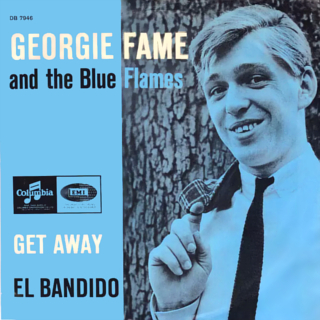
"Get Away" is a song by Georgie Fame and the Blue Flames, written by Georgie Fame. Initially written and recorded for an advertising campaign for petrol, the song was subsequently released on Columbia. It topped the UK Singles Chart for one week in July 1966.
"Keep On Running" is a song written and first recorded by Jackie Edwards. It became a hit in the UK for The Spencer Davis Group; their version reached number one in the charts.
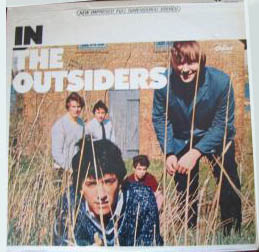
In is the third studio album by the Outsiders. It is the first album released by the band that did not make the Billboard charts.

With Their New Face On is the fourth studio album by the Spencer Davis Group, the first to be released after the departure of Steve Winwood, and his brother Muff Winwood. The album was released in 1968 in both the UK and the U.S. on the United Artists label.

Winwood is the first compilation album of music featuring Steve Winwood. This two-record set was issued in 1971 by United Artists Records and features music which Winwood performed with The Spencer Davis Group, Powerhouse, Traffic and Blind Faith. UA Records issued this album after Winwood's band Traffic left UA when their home label Island Records set up their own American operation. Issued without Winwood's authorization as catalogue number UAS-9950, it was taken off the market after legal action by Winwood and Island Records. It was then reissued with minor changes as catalogue number UAS-9964. Currently out of print, it was issued on CD by Universal Music of Japan for the Japanese market.

The Second Album is the second album by the British band the Spencer Davis Group, released in 1966. Many of the songs were a slightly experimental blend of beat, folk, jazz and blues. The album included Jackie Edwards' "Keep on Running", which gave the group their first U.K. number 1 single, and the R&B standard "Georgia on My Mind". The album spent eighteen weeks on the U.K. album chart, peaking at number 3. While the album was not released in the US, the single "Keep on Running" was released in February, 1966, and spent four weeks on the Billboard Hot 100 chart peaking at number 74 on March 12. Other tracks from this album were later released in the U.S. on various compilations of the band.
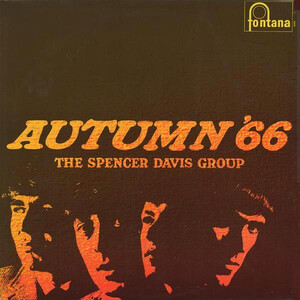
Autumn' 66 is the third studio album by the British rock group The Spencer Davis Group released in 1966. Although the album was not released in the US, the single "Somebody Help Me" was on the US Billboard Hot 100 charts for seven weeks and peaked at number 47 in July, 1967.

Revolutions – The Very Best of Steve Winwood is the sixth compilation album by Steve Winwood. The album includes music from Winwood's solo career, as well as groups with which he has performed, including the Spencer Davis Group, Traffic, and Blind Faith. The CD was released as a box set and a single disc. As of October 2014, the box set is out of print, while the single disc is still available. The songs "The Finer Things" and "Roll With It" are exclusive to the single disc version and cannot be found on the box set.
You Put the Hurt On Me is an EP released by the Spencer Davis Group in 1965 as Fontana Records, TE 17444, with liner notes by Chris Blackwell. The disc peaked on the British EP charts at # 4 in October 1965.

Their First LP is the debut studio album by the Spencer Davis Group, released in the UK and Europe in June 1965. It peaked at number 6 on the UK Albums Chart. Although never released in its original incarnation in the US, a majority of the tracks from this album were later released in various compilations of the band marketed to US audiences.

"She Needs Love" is a song written by Clint Ballard Jr. for Wayne Fontana and the Mindbenders. It was the third and final song written by him that the group recorded, following "The Game of Love" and "It's Just a Little Bit Too Late". Upon release, the single only reached number 32 in the UK, which prompted Fontana to pursue a solo career while the Mindbenders continued as a trio.
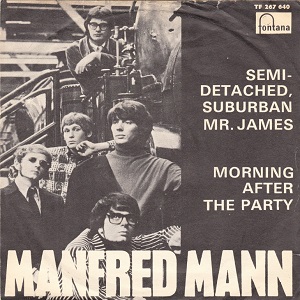
"Semi-Detached, Suburban Mr. James" is a song written by songwriters Geoff Stephens and John Carter, recorded by English pop group Manfred Mann in 1966. Stephens and Carter, who were writers for a publishing company on Denmark Street, London, wrote the song in a style different from their usual compositions, as love was not the prevalent theme. Introduced to the song by producer Shel Talmy, Manfred Mann recorded it at Philips Studio in August 1966. Released by Fontana Records on 21 October 1966, the song was backed by drummer Mike Hugg's composition "Morning After The Party" as the group's second single on the label. Keyboardist Manfred Mann plays the Mellotron on the recording; it was one of the earliest recordings featuring the instrument. Following a trend set by Bob Dylan, the song tackles the subject of life in British middle class suburbia from the perspective of a narrator, who laments the loss of a lover after her marriage to another man.


















